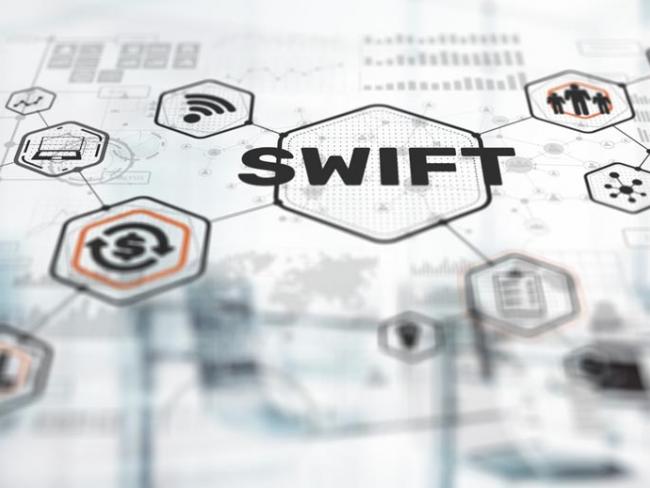
SWIFT processes over forty million online transactions a day. Photo Funtap/shutterstock.com.
As communications systems have become ever more centralised and monopolised, so too has state control of them. They are now weapons of war…
Underground empire: how America weaponised the world economy, Henry Farrell and Abraham Newman, hardback, 278 pages, ISBN 978-0241624517, Allen Lane, 2023, £25. Kindle & eBook editions available. Paperback edition due 5 September 2024.
This book, written by two American academics, is an astonishing and alarming account of how the USA controls the global financial transfer system.
In 1973, a group of European banks created SWIFT, the Society for Worldwide Interbank Financial Telecommunication. The US government changed SWIFT from a politically independent organisation, which was supposed to help protect banks from government regulation, into an all-seeing servant of the US state, mapping the hidden world of international financial transactions.
Now, SWIFT’s messaging system carries over ten billion messages a year, facilitating 1.25 quadrillion dollars in transactions. Every day, SWIFT processes over forty million transactions across the world. By comparison, China’s Cross-Border Interbank Payment System (CIPS) handles roughly thirteen thousand transactions a day, almost all in mainland China and Hong Kong.
Like SWIFT, the dollar clearing system plays a key role in the US control of global finance. It started with the Eurodollar market, which was touted as creating a decentred new realm of finance. In fact it made the global financial system more vulnerable to American control.
Dollar transactions
The international banks carry out international transactions in US dollars, which exposes them to the dollar clearing system. This is a set of complex financial arrangements run by US-regulated banks Citibank, JP Morgan, Goldman Sachs and others.
These monopolies spent decades building international markets in the name of efficiency and profit. They sought to dominate these markets, so that other businesses had to use their systems and pay tribute to them.
The flows of financial information are part of the global information flows that travel through communications networks based on US territory and subject to US surveillance. The US government has a stranglehold on the global communication system’s choke points.
Libertarian crypto entrepreneurs wanted to rebuild society’s communications networks on a different base using blockchain technology, the cornerstone of currencies such as Bitcoin (which used crypto to create a new kind of money). They had hoped that blockchain-based currencies and communication systems might cut out all intermediaries and protect society against the temptations of empire, stopping governments and corporations from controlling people’s lives.
Internet pioneers had hoped to provide the first truly decentralised means of global communication. Libertarians proclaimed that the internet undermined the government’s power to censor information and that cryptography made financial transactions unintelligible to government.
They claimed that currencies like Bitcoin would drastically decentralise economics and politics.
Instead the communications systems became an ever more centralised means of control. First, private businesses took charge of the new set of services, like the internet, payment processing (PayPal), and commoditised sharing (Uber and Airbnb). Most of these services were networks and got centralised over time, concentrating profits and power, following the usual logic of capital developing into monopolies.
Then governments, primarily the US government, seized control of centralised systems. Telecommunications companies, and e-commerce and platform companies like Google, Facebook, Microsoft and Yahoo! were all forced into line.
‘When Russia invaded Ukraine the US could weaponise the world’s financial systems…’
This level of state control meant that when Russia invaded Ukraine in 2022, the US government could immediately weaponise the whole world’s financial system against Russia. The US response shocked the Chinese government, which had never believed that the USA would go so far against a major country.
Russia accounted for 2 per cent of global trade – surely cutting its banks out of SWIFT would be too risky? But the USA (along with the EU) didn’t only weaponise SWIFT. They also blocked Russia’s access to its own currency reserves.
This posed a clear threat to China, which responded by trying to protect its capital holdings abroad. As US secretary of state Anthony Blinken noted on 22 May 2022, “Beijing, despite its rhetoric, is pursuing asymmetric decoupling, seeking to make China less dependent on the world and the world more dependent on China.”
The authors make the obvious comment – “[Blinken’s] words described America’s policy nearly as well as they did China’s. The United States, too, wanted to become less dependent on the world, either bringing production back home or ‘friendshoring’ it…so that the dangerous choke points in supply chains were on US territory or the territories of allies.”
Blocked
In October 2022, President Biden imposed the most far-reaching export controls on any single country since the end of the Cold War. He blocked China from acquiring technologies that would allow it to produce high-end semiconductors.
The authors point out that “As the United States considered new and harsher coercive options against China, it risked coming to resemble its adversary, driving other countries, businesses and individuals away…the United States and China can’t help but see each other’s actions as bids for global control.”
Once again, as before the First World War, rival empires are fighting for dominance, using the old means of armaments and blockades, with today’s added dangers of new forms of surveillance of communications and control of finance.
The authors say this new spiral of economic confrontation is gathering strength: “It might tear the global economy apart or even pull the world into actual war.”
